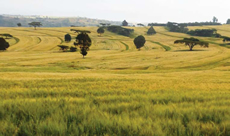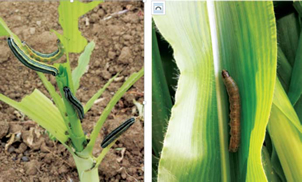Barley: A Major Cereal Grain
 Barley, Hordeumvulgare L is a major cereal grain and a member of the grass family. It is among the major grains by quantity produced behind corn, Rice and wheat. Barley is mainly used in malting, Animal feed and food for human consumption.
Barley, Hordeumvulgare L is a major cereal grain and a member of the grass family. It is among the major grains by quantity produced behind corn, Rice and wheat. Barley is mainly used in malting, Animal feed and food for human consumption.
Background
In the grasslands where people liked to live, barley grew wild, and people gathered it to eat boiled or ground into flour and baked when it came ripe every spring. People first began to farm barley (instead of picking it wild) around 11,000 BC in West Asia, possibly because of a climate change that made the world hotter and drier.
Read more ...
University of Eldoret Enhancing Agribusiness
 Enhancing Technology and Trade in Agriculture for National Growth
Enhancing Technology and Trade in Agriculture for National Growth
For the sixth year in a row, University of Eldoret has hosted the agribusiness trade fair show. The institution is located 9 kilometres from Eldoret town along Ziwa road off Eldoret- iten highway. Having a rich background in agriculture, University of Eldoret in the year 1946 was used by colonists to train large scale farmers. The institution still emphasizes on this objective of empowering farmers and having outreach programs from time to time. Agricultural and biotechnological courses take the largest percentage of the courses offered in the institution; this has enabled the university to be a research hub when it comes to agriculture, latest innovations and modern ways of practicing agriculture. Due to this capacity, the university launched the agribusiness trade fair show to share knowledge they had in their research and to involve other stakeholders in the industry to ensure the success of the activity.
The 6th agribusiness trade fair show which was held from 21st to 23rd of September 2017, was an exciting event which not only attracted small, medium and commercial farmers but also the entire society at large.
Apart from farmers; suppliers of agrochemical products, inputs and equipments, researchers, academicians, students, regional, state and county government ministry were also present. NGO’s, agro-processors, marketers, exporters, importers and distributors never missed this resourceful event. The show which was officially opened by Prof Amb Mbula the chancellor of the university paved way for exhibitors, farmers, researchers and students to transact.
This show came at a time farmers and other stakeholders in the agricultural sector were facing numerous adversities. North rift was heavily affected by adverse climatic changes between January and April when there was shortage of rain; due to this stalemate the region was heavily invaded by army worms which really destroyed and affected the crops. When it hurts, don’t press it but seek for a remedy, this is why farmers and researchers grazed the event in large numbers to find remedies for the challenges they were facing in the farm. The event which was held at the university’s pavilion square was heavily packed with stands from famous companies and emerging companies from agricultural industry.
From farm to the folks
The embassy of the kingdom of the Netherlands participated in the event as a major sponsor; their theme “farm to folk” intrigued many. The Kingdom of the Netherlands has demonstrated immense cooperation with the Kenyan horticultural industry especially cut flowers and vegetables. Due to their stability and good integration between companies, business, knowledge institutions and governments they have been able to extend their expertise to potato value chain and improved production of technology, storage and processing of the produce. Change is inevitable and it is why farmers were called upon to drop old ways of farming, to embrace technology and other emerging trends in the industry to realize good yields and food security in the country. “A hungry nation is an angry nation”, these sentiments were mentioned by Prof Mbula and literally no one is ever happy when hungry and a hungry person cannot deliver.
Therefore she called upon farmers to visit each and every stand to learn new agrochemicals in the market that can solve the challenges they are facing in the farm and to also learn about exciting technologies that can be used to do modern farming in a commercial way to feed the nation. Therefore, from farm to the folk initiative came with the all package, right from demonstrations from the farm how potatoes are to be planted, harvesting was also demonstrated by the use of potato harvester- modern way of harvesting potatoes; The Netherlands also demonstrated by the use of highly trained chefs both from Kenya and Dutch on how to cook these produce in an appetizing way. The only way to always measure the value of information and knowledge is when it is shared and communicated to the right person and at the right time.
Farms with highly knowledgeable researchers, with the latest technologies, companies with the latest research in crop diseases and crop protection came together to disseminate this knowledge and information to the farmers to ensure farming is done well in a commercial way so as to enhance economic growth and food security. The Future Farmers face numerous challenges, right from climatic conditions, lack of farm inputs, the cost of inputs and the polluted market not to mention unfair trade policies to those exporting their produce. The hopes of the farmers were really raised when cabinet secretary for finance Dr. Rotich passed the message that the government is working on fair trade policies so that farmers and growers earn well from their produce generated from sheer hard work.” The government will transform the agricultural sector and make policies that will absorb farmers’ produce with good prices”, cabinet secretary agriculture Hon Bett promised the farmers that they should not worry because the government have plans for them. Framers were also encouraged by Bett to adopt insurance policies for their livestock and crops so that incase of adversities they won’t be adversely affected. The future of agriculture is invested in the technological innovations, research and good government policies. These factors were discussed well especially the demonstrations of technological innovations already used in agriculture and latest varieties of the seeds from different companies at the farm, how they are planted taken care of and chemicals to be used so as to realize good yields.
The event created a platform for farmers to learn from experts, take notes, compare notes and purchased latest seeds and chemicals for their farms. This little transformation of farmers and farms one bit at a time will lead us into the future, when agriculture will be done in the right form by each and every farmer without finance being a limiting factor; When participation from banking sector in transforming agriculture is strengthen. Youth forms the largest part of the population; their participation in the agriculture industry will not only increase produce and improve food security but generate income and create employment country wide. Both Dr Rotich and Prof Mbula encouraged the youth to get their hands dirty and venture into agriculture.”The job market is crowded, shift your focus to the food value chain and fit in”, Prof Mbula said. Academic Institutions should develop programs to train youth on agribusiness and entrepreneurship so as to solve the challenges of unemployment.
Getting better
The smile from every farmer’s face as they walked out of the institution was evident that their hearts were at peace. This showed that they got a solution for their problems and they were yearning to put that into practice in their farms. Looking back, it is not pleasant but things are getting better. Relating to the farmers situation despite the challenges they face and the pains. There are still people who think through farmers problems and these are the organizers of this wonderful event and sponsors. They invested a lot and the institution that hosted the event because they have not only tried solve the challenges farmers’ society face but they have generated networks helpful to the farmers from this generation and beyond. This trade fair was a reminder that we are getting better and propelling ourselves out of the storms. Technology was well enhanced and trade emphasized when these two will be well integrated by farmers, there will be food security, reduction of unemployment and economical growth ad transformation of the entire nation. Information is power, whether you are in the agricultural field already or planning to join, seek information first that will be where to begin investing. Once you get the right information then you will have the right tools to kick start your investment as a farmer. Farmers, exhibitors, organizers and sponsors wished themselves farewell as they promised to attend the 7th agribusiness trade fair show next year. As an investor, exhibitor, sponsor and a farmer plan to attend the show next year and be part of the transformation.
 The government should offer support in terms of financing, machinery, subsidize fertilizer and seeds for barley farmers. These will encourage farmers to do it as a business where they are assured of return on investment, provide employment to youths and improve our exports which in turn improves our foreign exchange. Mr. Thomas Kipkorir, the Country Manager. Crop Protection and Public Health Business at BASF has worked with barley farmers for long. In a conversation with Cereals Magazine, he shared his experience.
The government should offer support in terms of financing, machinery, subsidize fertilizer and seeds for barley farmers. These will encourage farmers to do it as a business where they are assured of return on investment, provide employment to youths and improve our exports which in turn improves our foreign exchange. Mr. Thomas Kipkorir, the Country Manager. Crop Protection and Public Health Business at BASF has worked with barley farmers for long. In a conversation with Cereals Magazine, he shared his experience. Future Of Cereal Farming In Narok
Future Of Cereal Farming In Narok In the first evidence note (Fall Armyworm Status: Impacts and control options in Africa, Preliminary Evidence Note) written by CABI in April 2017, 17 countries confirmed FAW presence through official and unofficial sources. Nine more were suspected of having the pest. As this report shows however, the situation is constantly evolving.
In the first evidence note (Fall Armyworm Status: Impacts and control options in Africa, Preliminary Evidence Note) written by CABI in April 2017, 17 countries confirmed FAW presence through official and unofficial sources. Nine more were suspected of having the pest. As this report shows however, the situation is constantly evolving. Barley, Hordeumvulgare L is a major cereal grain and a member of the grass family. It is among the major grains by quantity produced behind corn, Rice and wheat. Barley is mainly used in malting, Animal feed and food for human consumption.
Barley, Hordeumvulgare L is a major cereal grain and a member of the grass family. It is among the major grains by quantity produced behind corn, Rice and wheat. Barley is mainly used in malting, Animal feed and food for human consumption. Enhancing Technology and Trade in Agriculture for National Growth
Enhancing Technology and Trade in Agriculture for National Growth